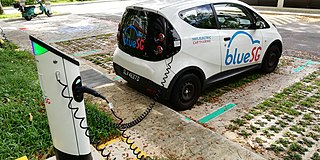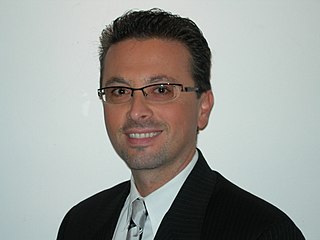
Biofuel is a fuel that is produced over a short time span from biomass, rather than by the very slow natural processes involved in the formation of fossil fuels such as oil. Biofuel can be produced from plants or from agricultural, domestic or industrial biowaste. Biofuels are mostly used for transportation, but can also be used for heating and electricity. Biofuels are regarded as a renewable energy source. The use of biofuel has been subject to criticism regarding the "food vs fuel" debate, varied assessments of their sustainability, and possible deforestation and biodiversity loss as a result of biofuel production.

Clean technology, also called cleantech or climatetech, is any process, product, or service that reduces negative environmental impacts through significant energy efficiency improvements, the sustainable use of resources, or environmental protection activities. Clean technology includes a broad range of technology related to recycling, renewable energy, information technology, green transportation, electric motors, green chemistry, lighting, grey water, and more. Environmental finance is a method by which new clean technology projects can obtain financing through the generation of carbon credits. A project that is developed with concern for climate change mitigation is also known as a carbon project.
The United States produces mainly biodiesel and ethanol fuel, which uses corn as the main feedstock. The US is the world's largest producer of ethanol, having produced nearly 16 billion gallons in 2017 alone. The United States, together with Brazil accounted for 85 percent of all ethanol production, with total world production of 27.05 billion gallons. Biodiesel is commercially available in most oilseed-producing states. As of 2005, it was somewhat more expensive than fossil diesel, though it is still commonly produced in relatively small quantities, in comparison to petroleum products and ethanol fuel.
Renewable fuels are fuels produced from renewable resources. Examples include: biofuels, Hydrogen fuel, and fully synthetic fuel produced from ambient carbon dioxide and water. This is in contrast to non-renewable fuels such as natural gas, LPG (propane), petroleum and other fossil fuels and nuclear energy. Renewable fuels can include fuels that are synthesized from renewable energy sources, such as wind and solar. Renewable fuels have gained in popularity due to their sustainability, low contributions to the carbon cycle, and in some cases lower amounts of greenhouse gases. The geo-political ramifications of these fuels are also of interest, particularly to industrialized economies which desire independence from Middle Eastern oil.
GreenFuel Technologies Corporation (GFT) was a startup that developed a process of growing algae using emissions from fossil fuels to produce biofuel from algae.

Choricystis is a genus of green algae in the class Trebouxiophyceae, considered a characteristic picophytoplankton in freshwater ecosystems. Choricystis, especially the type species Choricystis minor, has been proposed as an effective source of fatty acids for biofuels. Choricystis algacultures have been shown to survive on wastewater. In particular, Choricystis has been proposed as a biological water treatment system for industrial waste produced by the processing of dairy goods.

Algae fuel, algal biofuel, or algal oil is an alternative to liquid fossil fuels that uses algae as its source of energy-rich oils. Also, algae fuels are an alternative to commonly known biofuel sources, such as corn and sugarcane. When made from seaweed (macroalgae) it can be known as seaweed fuel or seaweed oil.
TerraVia Holdings, Inc. was a publicly held biotechnology company in the United States. TerraVia used proprietary technology to transform a range of low-cost plant-based sugars into high-value oils and whole algae ingredients. TerraVia supplied a variety of sustainable algae-based food ingredients to a number of brands, which included Hormel Food Corporation, Utz Quality Foods Inc and enjoy Life Foods. TerraVia also sold its own culinary algae oil under the Thrive Algae Oil brand.

Sustainable biofuel is biofuel produced in a sustainable manner. It is not based on petroleum or other fossil fuels. It includes not using plants that are used for food stuff to produce the fuel thus disrupting the world's food supply.

Cellana, Inc. is an American company which develops of algae-based bioproducts for high-value nutrition, ink, and bioenergy applications, including Omega-3 nutraceutical applications, sustainable ink, aquaculture and animal feeds, human food ingredients, pigments, specialty chemicals, and biofuels. The company, with offices in Hawaii and San Diego, has received multiple multimillion-dollar grants from the United States Department of Energy and United States Department of Agriculture.

An aviation biofuel is a biofuel used to power aircraft and is a sustainable aviation fuel (SAF). The International Air Transport Association (IATA) considers it a key element in reducing the environmental impact of aviation. Aviation biofuel is used to decarbonize medium and long-haul air travel. These types of travel generate the most emissions, and could extend the life of older aircraft types by lowering their carbon footprint. Synthetic paraffinic kerosene (SPK) refers to any non-petroleum-based fuel designed to replace kerosene jet fuel, which is often, but not always, made from biomass.

The use of biofuels varies by region. The world leaders in biofuel development and use are Brazil, United States, France, Sweden and Germany.
Algae fuel in the United States, as with other countries, is under study as a source of biofuel.

Dr. George Philippidis is a renewable energy and sustainability leader, who has published and spoken extensively about the global need for renewable energy as the foundation of a green economy and a sustainable society. He advocates the development of renewable power and fuels to enhance energy security, combat climate change, and secure sustainable economic growth. He has authored 11 cleantech patents, written numerous articles, and spoken nationally and internationally emphasizing that renewable energy can initially supplement and augment current resources and progressively replace fossil energy based on its own merits rather than on government policy.
Nasrin Moazami is an Iranian medical microbiologist and biotechnologist. She received her Ph.D. in 1976 from the Faculty of Medicine at Laval University. Moazami is the pioneer of biotechnology and microalgae-based fuels in Iran.

Microalgae or microscopic algae grow in either marine or freshwater systems. They are primary producers in the oceans that convert water and carbon dioxide to biomass and oxygen in the presence of sunlight.
Carbon-neutral fuel is fuel which produces no net-greenhouse gas emissions or carbon footprint. In practice, this usually means fuels that are made using carbon dioxide (CO2) as a feedstock. Proposed carbon-neutral fuels can broadly be grouped into synthetic fuels, which are made by chemically hydrogenating carbon dioxide, and biofuels, which are produced using natural CO2-consuming processes like photosynthesis.
Sammy Boussiba is a professor emeritus at the French Associates Institute for Agriculture and Biotechnology of Drylands at the Jacob Blaustein Institutes for Desert Research at Ben-Gurion University of the Negev, Israel.

Chlorella vulgaris is a species of green microalga in the division Chlorophyta. It is mainly used as a dietary supplement or protein-rich food additive in Japan.











